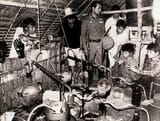Search Results
7/6/2025, 11:24:40 AM
>>17818653
After the war KMT rule was restored but unexpectedly evicted from China by the Communists shortly. The KMT who scattered into Burma instead of Taiwan started the drug trade there, forming the Golden Triangle. Widespread Opium use ended quickly after the Communist takeover, which is all you need to know about the relations between different factions and the drug trade.
>The Kuomintang in Burma (Chinese: 泰緬孤軍; pinyin: Tàimiǎn gū jūn; Wade–Giles: T‘ai4-mien3 ku1 chün1) or Kuomintang in the Golden Triangle, which was officially known as the Yunnan Province Anti-Communist National Salvation Army (Chinese: 雲南反共救國軍; pinyin: Yúnnán fǎngòng jìuguó jūn; Wade–Giles: Yün2-nan3 Fan3-kung4 Chiu4-kuo2 Chün1) were troops of the Republic of China Army loyal to the Kuomintang that fled from China to Burma in 1950 after their defeat by the Chinese communists in the Chinese Civil War. They were commanded by Lieutenant-General Li Mi. It attempted several incursions into Yunnan in the early 1950s, only to be pushed back into Burma each time by the People's Liberation Army
>The entire campaign, with logistical support from the Republic of China which had retreated to Taiwan, the United States, and Thailand, was controversial from the start, as it weakened Burmese sovereignty and introduced the KMT's involvement in the region's lucrative opium trade. In 1953, the frustrated Burmese government appealed to the United Nations and put international pressure on the Republic of China to withdraw its troops to Taiwan the following year. As a result, the United States initiated a Four-Nation Military Commission (Burma, the United States, the Republic of China, and Thailand) to negotiate the KMT withdrawal. On 30 May 1954, General Li Mi announced the dissolution of the Yunnan Province Anti-Communist National Salvation Army. However, 6,000 irregular KMT troops remained in Burma
After the war KMT rule was restored but unexpectedly evicted from China by the Communists shortly. The KMT who scattered into Burma instead of Taiwan started the drug trade there, forming the Golden Triangle. Widespread Opium use ended quickly after the Communist takeover, which is all you need to know about the relations between different factions and the drug trade.
>The Kuomintang in Burma (Chinese: 泰緬孤軍; pinyin: Tàimiǎn gū jūn; Wade–Giles: T‘ai4-mien3 ku1 chün1) or Kuomintang in the Golden Triangle, which was officially known as the Yunnan Province Anti-Communist National Salvation Army (Chinese: 雲南反共救國軍; pinyin: Yúnnán fǎngòng jìuguó jūn; Wade–Giles: Yün2-nan3 Fan3-kung4 Chiu4-kuo2 Chün1) were troops of the Republic of China Army loyal to the Kuomintang that fled from China to Burma in 1950 after their defeat by the Chinese communists in the Chinese Civil War. They were commanded by Lieutenant-General Li Mi. It attempted several incursions into Yunnan in the early 1950s, only to be pushed back into Burma each time by the People's Liberation Army
>The entire campaign, with logistical support from the Republic of China which had retreated to Taiwan, the United States, and Thailand, was controversial from the start, as it weakened Burmese sovereignty and introduced the KMT's involvement in the region's lucrative opium trade. In 1953, the frustrated Burmese government appealed to the United Nations and put international pressure on the Republic of China to withdraw its troops to Taiwan the following year. As a result, the United States initiated a Four-Nation Military Commission (Burma, the United States, the Republic of China, and Thailand) to negotiate the KMT withdrawal. On 30 May 1954, General Li Mi announced the dissolution of the Yunnan Province Anti-Communist National Salvation Army. However, 6,000 irregular KMT troops remained in Burma
Page 1
